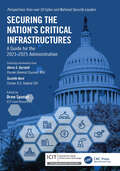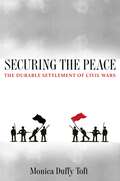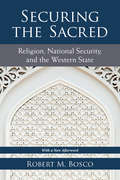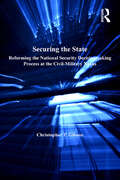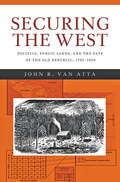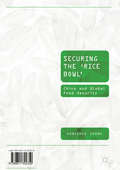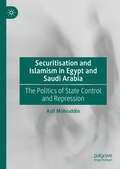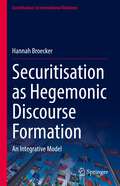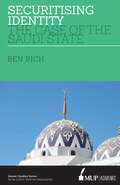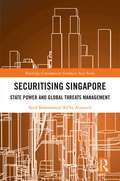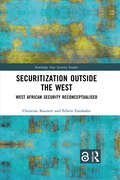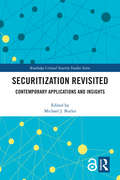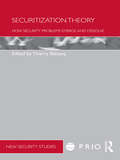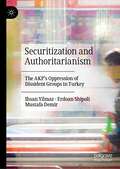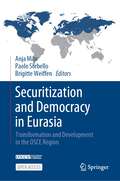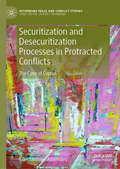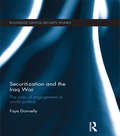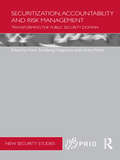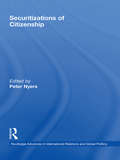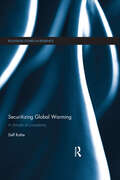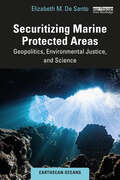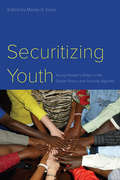- Table View
- List View
Securing the Nation’s Critical Infrastructures: A Guide for the 2021-2025 Administration
by Drew SpanielSecuring the Nation’s Critical Infrastructures: A Guide for the 2021–2025 Administration is intended to help the United States Executive administration, legislators, and critical infrastructure decision-makers prioritize cybersecurity, combat emerging threats, craft meaningful policy, embrace modernization, and critically evaluate nascent technologies. The book is divided into 18 chapters that are focused on the critical infrastructure sectors identified in the 2013 National Infrastructure Protection Plan (NIPP), election security, and the security of local and state government. Each chapter features viewpoints from an assortment of former government leaders, C-level executives, academics, and other cybersecurity thought leaders. Major cybersecurity incidents involving public sector systems occur with jarringly frequency; however, instead of rising in vigilant alarm against the threats posed to our vital systems, the nation has become desensitized and demoralized. This publication was developed to deconstruct the normalization of cybersecurity inadequacies in our critical infrastructures and to make the challenge of improving our national security posture less daunting and more manageable. To capture a holistic and comprehensive outlook on each critical infrastructure, each chapter includes a foreword that introduces the sector and perspective essays from one or more reputable thought-leaders in that space, on topics such as: • The State of the Sector (challenges, threats, etc.) • Emerging Areas for Innovation • Recommendations for the Future (2021–2025) Cybersecurity Landscape ABOUT ICIT The Institute for Critical Infrastructure Technology (ICIT) is the nation’s leading 501(c)3 cybersecurity think tank providing objective, nonpartisan research, advisory, and education to legislative, commercial, and public-sector stakeholders. Its mission is to cultivate a cybersecurity renaissance that will improve the resiliency of our Nation’s 16 critical infrastructure sectors, defend our democratic institutions, and empower generations of cybersecurity leaders. ICIT programs, research, and initiatives support cybersecurity leaders and practitioners across all 16 critical infrastructure sectors and can be leveraged by anyone seeking to better understand cyber risk including policymakers, academia, and businesses of all sizes that are impacted by digital threats.
Securing the Peace: The Durable Settlement of Civil Wars
by Monica Duffy ToftTimely and pathbreaking, Securing the Peace is the first book to explore the complete spectrum of civil war terminations, including negotiated settlements, military victories by governments and rebels, and stalemates and ceasefires. Examining the outcomes of all civil war terminations since 1940, Monica Toft develops a general theory of postwar stability, showing how third-party guarantees may not be the best option. She demonstrates that thorough security-sector reform plays a critical role in establishing peace over the long term. Much of the thinking in this area has centered on third parties presiding over the maintenance of negotiated settlements, but the problem with this focus is that fewer than a quarter of recent civil wars have ended this way. Furthermore, these settlements have been precarious, often resulting in a recurrence of war. Toft finds that military victory, especially victory by rebels, lends itself to a more durable peace. She argues for the importance of the security sector--the police and military--and explains that victories are more stable when governments can maintain order. Toft presents statistical evaluations and in-depth case studies that include El Salvador, Sudan, and Uganda to reveal that where the security sector remains robust, stability and democracy are likely to follow. An original and thoughtful reassessment of civil war terminations, Securing the Peace will interest all those concerned about resolving our world's most pressing conflicts.
Securing the Sacred: Religion, National Security, and the Western State
by Robert M. BoscoSince the terrorist attacks of September 11, 2001, Western nations have increasingly recognized religion as a consideration in domestic and foreign policy. In this empirical comparison of the securitization of Islam in Britain, France, and the United States, Robert M. Bosco argues that religion is a category of phenomena defined by the discourses and politics of both religious and state elites. Despite significant theoretical distinctions between securitization on the domestic and the international levels, he finds that the outcome of addressing religion within the context of security hinges upon partnerships. Whereas states may harness the power of international allies, they cannot often find analogous domestic allies; therefore, states that attempt to securitize religion at home are more vulnerable to counterattack and more likely to abandon their efforts. Securing the Sacred makes a significant contribution to the fields of political theory, international relations, Islamic studies, and security/military studies.
Securing the State: Reforming the National Security Decisionmaking Process at the Civil-Military Nexus (Military Strategy And Operational Art Ser.)
by Christopher P. GibsonFocusing on top civilian and military advisors within the national security establishment, this significant book looks at four case studies with a focus on civil-military relations within the US Department of Defense. It investigates whether balanced approaches produce more effective policies and outcomes than dominating structures. The culmination of Gibson's treatise is the advancement of the 'Madisonian approach' to civilian control of the military, a normative framework designed to replace Samuel Huntington's 'Objective Control' model and also the 'Subjective Control' model, initially practised by Defense Secretary Robert McNamara and most recently by Defense Secretary Donald Rumsfeld. The Madisonian approach calls for changes in US law and new norms to guide the interactions of key participants who populate the civil-military nexus. This book is destined to influence US strategic thinking and should be added to the syllabus of courses in civil-military relations, strategic studies and military history. Given the struggling US policy in Iraq, the time is right for a critical review of US civil-military relations and this book provides the departure point for analysis and a potential way forward.
Securing the West: Politics, Public Lands, and the Fate of the Old Republic, 1785–1850 (Reconfiguring American Political History)
by John R. van Van AttaA close look at westward expansion, federal lands, and American destiny in the early republic.Few issues defined the period between American independence and the Mexican War more sharply than westward settlement and the role of the federal government in that expansion. In Securing the West, John R. Van Atta examines the visions of the founding generation and the increasing influence of ideological differences in the years after the peace of 1815. Americans expected the country to grow westward, but on the details of that growth they held strongly different opinions. What part should Congress play in this development? How much should public land cost? What of the families and businesses left behind, and how would society's institutions be established in the West? What of the premature settlers, the "squatters" who challenged the rule of law while epitomizing democratic daring? Taking a broad approach, Van Atta addresses three interrelated queries: First, how did competing economic beliefs and divergent cultural mandates influence the various outcomes of this broad debate over the means, timing, and purposes of settling the trans-Appalachian West? Second, what alternative visions of western society lay behind the battles among policy makers within the government and the interested parties who would sway them? Third, why did settlement of the West take such a different course in the end from that which the earliest leaders of the republic intended? This story explores dimensions of the federal lands question that other historians have minimized or left out entirely. Van Atta draws upon a range of sources known to have influenced the public discourse, including congressional debates, committee reports, and correspondence; editorial writings by the famous and unknown; and news coverage in various widely circulated newspapers and magazines of the period. Much of the attention focuses on Congress—the elected leaders who advocated divergent plans about western lands. In Congress, more than any other place, public leaders articulated basic concerns about the character, structure, direction, and destiny of society in the early United States. By 1830, many other important national concerns had become critically entangled with land disposition, creating points of ideological tension among rival regions, parties, and interests in the early years of the republic—particularly in Jacksonian America.
Securing the ‘Rice Bowl’: China and Global Food Security
by Hongzhou ZhangThis book offers a snappy but comprehensive investigation of how the resource needs of today could become the resource conflicts of tomorrow. As the most populous country in the world, the security of China’s “rice bowl” is not only a top political priority for China’s policymakers but increasingly a critical global concern as the country emerges as a leading food importer and a major player in outward agricultural investment. This book sheds light on China’s efforts, both at home and abroad, to safeguard its food security and how these efforts will affect global food systems. This book will be of interest to industry analysts, institutional investors, and scholars of China's global rise.
Securities Against Misrule
by Jon ElsterElster proposes a normative theory of collective decision making, inspired by Jeremy Bentham but not including his utilitarian philosophy. The central proposal is that in designing democratic institutions one should reduce as much as possible the impact of self-interest, passion, prejudice and bias on the decision makers, and then let the chips fall where they may. There is no independently defined good outcome that institutions can track, nor is there any way of reliably selecting good decision makers. In addition to a long initial chapter that surveys theories of collective decision making, notably social choice theory, and a chapter expounding and discussing Bentham's views, historical chapters on the jury, constituent assemblies and electoral systems develop and illustrate the main ideas. This work draws on a welter of case studies and historical episodes, from Thucydides and Plutarch to the present. It is also grounded in psychology, behavioral economics and law.
Securitisation and Islamism in Egypt and Saudi Arabia: The Politics of State Control and Repression
by Asif MohiuddinThis book provides a comparative analysis of how Egypt and Saudi Arabia have framed Islamism as a security threat to consolidate power. Using securitisation theory, it explores how both regimes systematically criminalise Islamist movements—blurring the line between political opposition and extremism—to justify sweeping authoritarian measures. It exposes the far-reaching implications of this securitisation for governance, civil liberties and human rights by examining mass incarcerations, legal restrictions and state-controlled narratives. Situating these practices within broader global security and counterterrorism discourses, the book highlights how securitisation reinforces authoritarian resilience and shapes international perceptions of political Islam. It critiques global support for repressive policies enacted under the guise of counterterrorism and advocates for inclusive governance that upholds human rights and fosters long-term stability. This book serves as a vital resource for scholars, policymakers and students seeking critical insights into the nexus of security, governance and human rights in the contemporary Middle East.
Securitisation as Hegemonic Discourse Formation: An Integrative Model (Contributions to International Relations)
by Hannah BroeckerThis book offers a model for understanding securitization in terms of hegemonic discourse formations. It re-thinks the very meaning of security as well as the relationship between the understanding of security in traditional and critical approaches in security studies to find a common denominator between them. Deduced firmly from realist political philosophy and its analytic categories, such as state-based sovereignty, security is presented as a function of discursive formations. Providing a sound discourse-theoretical foundation which includes both linguistic and non-linguistic practices as well as a focus on relationships of power, the book offers a basis for the integration of insights generated by the different approaches to securitisation, and enhances the analytical and explanatory depth of the concept. As part of its theoretical foundation, the book further presents a fundamentally new image of long-standing theoretical and conceptual challenges within speech-act inspired approaches, including the re-formulation of central analytical categories such as the speaker-audience-context nexus. By explaining securitisation as signifying the boundaries of the construction of meaning, it presents an original understanding of securitisation, which is deeply integrated into the structures of the social construction of meaning. On this basis, the book offers a new understanding of successful securitisation factors and insights into aspects that render specific objects more or less likely for securitisation. The book proceeds to discuss two central aspects of the securitisation debate: The constitution of power, as well as an exploration of the nature of the political and politicisation. An empirical case study on the development-security-nexus offers further insights into the applicability of the theoretical model. This book will appeal to students, researchers, and scholars of political science and international relations (IR) interested in a better understanding of IR theory, realism, critical security studies, and discourse analysis.
Securitising Identity: The Case of the Saudi State (Islamic Studies Series)
by Ben RichWhy has the relationship between the state and the Islamic revivalist movement known commonly as 'Wahhabism' persisted under Saudi rule since 1744? In Securitising Identity Ben Rich traces the symbiosis between these two entities across three distinct periods of Saudi rule over the past four centuries, showcasing the consistent conditions, patterns of behaviour and political logics that surround their interplay. Collectively, these reveal a recurrent tendency in which the state paradoxically offers protections to the preservation of revivalism while generating threats against this same religious identity in order to ensure its hold on power. Such a pattern, he argues, not only transcends all discrete periods of Saudi rule, but also manifests regardless of the conservative or progressive nature of a particular administration. Understanding such a pattern not only helps to explain why Saudi Arabia today remains a source of regional sectarianism, but also how such an idiomatic ideology has endured in the face of high modernity and why the state it is likely to struggle in its ongoing quest to open itself further to a diverse and pluralistic world. Islamic Studies Series - Volume 24
Securitising Singapore: State Power and Global Threats Management (Routledge Contemporary Southeast Asia Series)
by Syed Mohammed AljuniedAljunied examines how the Singaporean government developed a comprehensive state–society strategic relationship by ‘securitising’ vital policy areas because of Singapore’s vulnerability as a global city state. In the twenty-first century, the Singaporean government has strategically renewed an existing form of authoritarian rule by ‘militarising’ national security governance. The main objective is to widen and deepen state power. Senior military-trained civilian political leaders and bureaucrats use military personnel, command and control, terminology and strategy of war to deal with non-traditional security challenges leading to the state’s further domination over civil liberty and civil society. Aljunied analyses the information and communication, health and climate–environment sectors. The case studies highlight the way the Singaporean government has used varying forms of political engagement, surveillance and legislation to limit civil liberty and inhibit the development of civil society. This book is a valuable resource for researchers and students of Singapore Studies as well as for the readers of Security Studies with an interest in the global–local nexus in a small state context. It is a pioneering scholarly study on the national security framework and the use of non-traditional security discourse to strengthen state power and social stability at the expense of political liberalism.
Securitization Outside the West: West African Security Reconceptualised (Routledge New Security Studies)
by Christian Kaunert Edwin EzeokaforThis book analyses securitization processes outside of the West, with a focus on Africa. The aim of the volume is to develop an original analytical framework to explain the securitization-neo-patrimonialism dynamics in West Africa, drawing upon insights from securitization theory, sociology and psychology. Among critical voices, securitization has become the gold standard for analysing emerging challenges, such as migration, terrorism, and human security. Yet, despite its broadening agenda, the framework has also been accused of bias, with a Western political context and democratic governance structure at its heart. This book aims to re-conceptualise the framework in a way that suits non-Western contexts better, notably by re-conceptualising the securitization-neopatrimonialism nexus in Africa, which gives us significant new insights into non-Western political contexts. It analyses the securitization processes among the political elites under neo-patrimonial statehood, and further stretches the conceptualisation of securitization into African statehood, which is characterised by a blurred line between the leader and the state. The volume explores the processes of securitizing threats in Liberia, Sierra Leone and wider West Africa, as well as the neo-patrimonial regimes of these states. In doing so, it explores the influence these states’ neo-patrimonial regimes have on the processes of threat securitization. This book will be of much interest to students of critical security studies, African politics and International Relations.
Securitization Revisited: Contemporary Applications and Insights (Routledge Critical Security Studies)
by Michael ButlerThis book seeks to interrogate how contemporary policy issues become ‘securitized’ and, furthermore, what the implications of this process are. A generation after the introduction of the concept of securitization to the security studies field, this book engages with how securitization and desecuritization ‘works’ within and across a wide range of security domains including terrorism and counter-terrorism, climate change, sexual and gender-based violence, inter-state and intra-state conflict, identity, and memory in various geographic and social contexts. Blending theory and application, the contributors to this volume – drawn from different disciplinary, ontological, and geographic ‘spaces’ – orient their investigations around three common analytical objectives: revealing deficiencies in and through application(s) of securitization; considering securitization through speech-acts and discourse as well as other mechanisms; and exposing latent orthodoxies embedded in securitization research. The volume demonstrates the dynamic and elastic quality of securitization and desecuritization as concepts that bear explanatory fruit when applied across a wide range of security issues, actors, and audiences. It also reveals the deficiencies in restricting securitization research to an overly narrow set of issues, actors, and mechanisms. This volume will be of great interest to scholars of critical security studies, international security, and International Relations.
Securitization Theory: How Security Problems Emerge and Dissolve (PRIO New Security Studies)
by Thierry BalzacqThis volume aims to provide a new framework for the analysis of securitization processes, increasing our understanding of how security issues emerge, evolve and dissolve. Securitisation theory has become one of the key components of security studies and IR courses in recent years, and this book represents the first attempt to provide an integrated and rigorous overview of securitization practices within a coherent framework. To do so, it organizes securitization around three core assumptions which make the theory applicable to empirical studies: the centrality of audience, the co-dependency of agency and context and the structuring force of the dispositif. These assumptions are then investigated through discourse analysis, process-tracing, ethnographic research, and content analysis and discussed in relation to extensive case studies. This innovative new book will be of much interest to students of securitisation and critical security studies, as well as IR theory and sociology. Thierry Balzacq is holder of the Tocqueville Chair on Security Policies and Professor at the University of Namur. He is Research Director at the University of Louvain and Associate Researcher at the Centre for European Studies at Sciences Po Paris.
Securitization and Authoritarianism: The AKP’s Oppression of Dissident Groups in Turkey
by Ihsan Yilmaz Erdoan Shipoli Mustafa DemirThis book focuses on securitization and authoritarianism in Turkey with research on the country’s Islamist populist ruling party’s (AKP) oppression of different socio-political, ethnic and religious groups. In doing so, it analyzes how the AKP has securitized to oppress different socio-political groups and identities, according to the time and need for the party's political survival. Research in the book sheds light on the use of traumas, conspiracy theories, and fear as tools in the securitization and repression processes.
Securitization and Democracy in Eurasia: Transformation and Development in the OSCE Region
by Anja Mihr Brigitte Weiffen Paolo SorbelloThis open-access book presents cutting-edge research on securitization and democratic development in the OSCE Region. Gathering contributions by practitioners and researchers from various disciplines, it presents case studies and highlights recent activities of proactive engagement in democratic institution-building and responding to security threats from the Balkans to Central Asia. The volume is divided into three parts, the first of which focuses on security-related matters, armed conflicts, minorities, and women’s safety, as well as the roles that civil society, foreign governments, social media, and external donors play in this area. These contributions illustrate how the OSCE’s informal approach to peace, security, and securitization as norm entrepreneur is closely linked to the level of democracy among its member states. The second part presents a special section on the political implications of China’s Belt and Road Initiative (BRI), assessing the impact of this infrastructural program on the levels of democracy and/or autocracy in Eurasia. The third part consists of short chapters outlining future research and debates. The book will appeal to students and scholars of international relations, security studies, and the human rights-politics nexus. This is the 2022 instalment in a series of books released by the OSCE Academy in Bishkek. The OSCE works to promote Minority Protection, Security, Democratic Development and Human Rights, guided by the Office for Democratic Institutions and Human Rights (ODIHR), and to enhance securitization and development policies in Eurasia, Europe, Central Asia and North America. Since being founded in 1993, the OSCE and its agencies and departments have attracted a wealth of academic research in various fields and disciplines, ranging from economic development and election monitoring to enhancing global principles of human rights and securitization.
Securitization and Desecuritization Processes in Protracted Conflicts: The Case of Cyprus (Rethinking Peace and Conflict Studies)
by Constantinos AdamidesUsing the Cyprus conflict as a case study, this book examines how the securitization process in protracted conflict environments changes, as it becomes routinized and potentially even institutionalized. Furthermore, the process is not limited to the mainstream top-down path, as it also follows a horizontal and even bottom-up direction, which inevitably has an impact on the goals and securitization options of both the mainstream securitizing actors and the audience(s). Lastly, on a theoretical level it examines how the multi-directional securitization forces have an impact on the elite and audience-driven desecuritization efforts and ultimately on the prospects for conflict resolution. The book’s case study, the Cyprus question, offers an alternative reading of the forces dominating the specific conflict, while concurrently offers a useful framework for the study of similar protracted and deeply securitized conflicts.
Securitization and the Iraq War: The rules of engagement in world politics (Routledge Critical Security Studies)
by Faye DonnellyThis book critiques the conceptualization of security found in mainstream and critical theoretical debates, and applies this to the empirical case of the 2003 Iraq War. The Iraq War represents one of the most puzzling, complex, and controversial events in the post-Cold War era. The manner in which the Bush administration finally decided to hold Saddam Hussein accountable through military intervention provoked a worldwide outcry due to the narratives they constructed to justify the "pre-emptive use of force" and "enhanced interrogation techniques." Responding to constructivist and post-structuralist scholars' calls for a turn to discourse, and aligning its argument with critical security studies, particularly the Copenhagen School (CS), this book conceptualizes language as a pivotal mechanism of power. Adopting a Wittgensteinian approach, it moves away from thinking about the nexus between security and language from a single action, or speech act, to a series of actions or interactions. To illustrate this new approach, the author examines two cases in particular: the UN inspectors' finding that there was no credible evidence that Iraq possessed weapons of mass destruction (WMD) in early 2003 and the Abu Ghraib scandal in 2004. Both events show that the boundaries and relations between securitized rules and environments are not pre-given but produced in a particular language game. This book will be of much interest to students of critical security studies, US foreign policy, and IR in general.
Securitization of Property Squatting in Europe (Routledge Research in Urban Politics and Policy)
by Mary ManjikianHousing is no longer about having a place to live – but about state pressures to conform, norms and policies regarding citizenship, and practices of surveillance and security. Breaking new ground in the field of urban politics and international relations, Securitization of Property Squatting in Europe examines and critiques legislative initiatives and examines governmental attempts to reframe urban property squatting as a crime and a threat to domestic security. Using examples from France, Netherlands, Denmark, and Great Britain, Mary Manjikian argues that developments within the European Union – including terrorist attacks in London and Madrid, the rise of right wing extremist parties, and the lifting of barriers to immigration and travel within the EU – have had effects on housing policy, which has become the subject of state security policy in Europe’s urban areas. In Denmark, squatting has often had an ideological, anti-state character. In Paris, housing policy can be viewed as a type of identity politics with squatters as transnational actors who pose a transnational security threat. In Great Britain, the role of the press has created a drive to criminalize squatting. Events in the Netherlands present two competing notions of what housing is – a human right, or an economic good produced by the free market.
Securitization, Accountability and Risk Management: Transforming the Public Security Domain (PRIO New Security Studies)
by Ulrika Mörth Karin Svedberg HelgessonThis edited volume examines the reconstitution of the public security domain since the 9/11 attacks, focusing on the banking sector and anti-money laundering (AML) activity in particular. Since the inception of the ‘Financial Action Taskforce’ (FATF) in 1989, AML has been viewed as a global problem. This text argues that the securitization of the financial sector as a result of AML has entailed the emergence of a new public security domain, which transcends the classic public-private divide. The analysis in the volume is multidisciplinary and combines concepts and theories from the literature on securitization, the public-private divide, and business/management. The authors argue that the state is under transformation and that the developments in the security field are part of an ongoing renegotiation of the relationship between the state and the business sector. Securitization, Accountability and Risk Management therefore contributes to a deeper understanding of how the power relationships have changed between the public and the private sectors after 9/11. This interdisciplinary book will be of much interest to students of critical security, risk management, business studies, critical legal studies and IR in general.
Securitizations of Citizenship (Routledge Advances in International Relations and Global Politics)
by Peter NyersSecuritizations of Citizenship investigates how the fate of citizenship is now caught up in a dramatic and dangerous process of securitizing political communities. In the nervous state of affairs of the post-9/11 period, technologies of surveillance and control are rapidly proliferating, creating severe constraints for the enactment of citizenship practices. While citizenship has always faced the problem of exclusiveness, the contemporary relationship between security, territory, and population is being transformed in ways that are creating new dynamics of exclusion for citizens, non-citizens, and quasi-citizens alike. This book assesses a variety of citizenship practices in relation to the emergence of forms of governance that are responsive to – and constitutive of – fears, anxieties, and insecurities in the population. At the same time, the book identifies and assesses citizenship practices for how they can mobilize progressive forces to militate against the nervous, anxious and fearful subjectivities instigated by newly securitized sovereignties. In the critical spaces between inclusion and exclusion, migration and mobility, security and surveillance, reason and neurosis, biopower and sovereign power, the contributors to this book reflect upon the possibilities and constraints for refiguring citizenship today.
Securitized Citizens: Canadian Muslims’ Experiences of Race Relations and Identity Formation Post–9/11
by Baljit NagraUninformed and reactionary responses in the years following the events of 9/11 and the ongoing ‘War on Terror’ have greatly affected ideas of citizenship and national belonging. In Securitized Citizens, Baljit Nagra, develops a new critical analysis of the ideas dominant groups and institutions try to impose on young Canadian Muslims and how in turn they contest and reconceptualize these ideas. Nagra conducted fifty in-depth interviews with young Muslim adults in Vancouver and Toronto and her analysis reveals how this group experienced national belonging and exclusion in light of the Muslim ‘other’, how they reconsidered their cultural and religious identity, and what their experiences tell us about contemporary Canadian citizenship. The rich and lively interviews in Securitized Citizens successfully capture the experiences and feelings of well-educated, second-generation, and young Canadian Muslims. Nagra acutely explores how racial discourses in a post–9/11 world have affected questions of race relations, religious identity, nationalism, white privilege, and multiculturalism.
Securitizing Global Warming: A Climate of Complexity (Routledge Studies in Resilience)
by Delf RotheThis book explores the reasons for a recent securitization of climate change, and reveals how the understanding of climate change as a security threat fuels resilience as a contemporary political paradigm. Since 2007, political and public discourse has portrayed climate change in terms of international or national security. This increasing attention to the security implications of climate change is puzzling, however, given the fact that linkages between climate change and conflict or violence are heavily disputed in the empirical literature. This book explains this trend of a securitization of global warming and discusses its political implications. It traces the actor coalition that promoted the idea of climate change as a security issue and reveals the symbols, narratives and storylines that make up this discourse. Drawing on three detailed case studies at the international level of the United Nations, the regional level of the Euro-Mediterranean and the national level of the UK, the book reveals how climate change is turned into a non-linear and unpredictable threat. The resulting complexity discourse prevents the adoption of any exceptional measures and instead presents resilience as the only way to cope with the climate threat. This book shows that we can only grasp the complexity of the securitization process and its implications in the climate change case by comparing it at different political levels over a longer period. By developing a securitization framework the book makes an important contribution to the ongoing debate on security and resilience in critical security studies. This book will be of much interest to students of critical security studies, resilience, environmental studies, global governance and IR in general.
Securitizing Marine Protected Areas: Geopolitics, Environmental Justice, and Science (Earthscan Oceans)
by Elizabeth M. De SantoThis book presents a novel examination of Marine Protected Areas within a security context, bridging science, policy, and geopolitics, and addressing the often-under-emphasized aspect of environmental justice.The book argues that Marine Protected Areas (MPAs) are not only a critical tool for protecting marine biodiversity in a changing climate, but they also play an important role at the intersection of geopolitics and environmental justice, and they provide a case study of environmental governance at the science-policy interface. The book takes an interdisciplinary and critical approach and builds on the author's two decades of experience working in this field. Geopolitically, it explores the ways in which MPAs provide footprints for influence and access to resources far from home for nations with overseas territories. MPAs also raise important issues connected to equity, environmental justice, and social justice, including access to resources and participation in environmental decision-making processes, key aspects for achieving long-term conservation goals. The book also demonstrates how MPAs are a critical lens for understanding how policy makers cope with scientific uncertainty, and the necessity of well-designed and precautionary science advisory processes. While the ecological contribution of MPAs is paramount, social issues and geopolitical considerations are often less obvious in the discourse underpinning MPAs, and the resulting tensions can undermine long-term conservation objectives. By applying the three lenses of geopolitics, environmental justice and science, this book provides key insights to help the international community moving past the 2030 biodiversity targets and beyond, towards a future of meaningful, equitable, and effective conservation approaches.This book will be of great interest to students and scholars of biodiversity conservation, marine studies, political geography, environmental governance, and science-policy studies. It will also be of interest to marine conservation governance professionals and policymakers.
Securitizing Youth: Young People’s Roles in the Global Peace and Security Agenda
by Jeni Klugman Victoria Bishop Nasrat Khalid Valeria Izzi Carole MacNeil Ali Altiok Willice Onyango Grace Atuhaire Matthew Moore Diana BudurSecuritizing Youth offers new insights on young people’s engagement in a wide range of contexts related to the peace and security field. It presents empirical findings on the challenges and opportunities faced by young women and men in their efforts to build more peaceful, inclusive, and environmentally secure societies. The chapters included in this edited volume examine the diversity and complexity of young people’s engagement for peace and security in different countries across the globe and in different types and phases of conflict and violence, including both conflict-affected and relatively peaceful societies. Chapter contributors, young peacebuilders, and seasoned scholars and practitioners alike propose ways to support youth’s agency and facilitate their meaningful participation in decision-making. The chapters are organized around five broad thematic issues that correspond to the 5 Pillars of Action identified by UN Security Council Resolution 2250. Lessons learned are intended to inform the global youth, peace, and security agenda so that it better responds to on-the-ground realities, hence promoting more sustainable and inclusive approaches to long-lasting peace.
